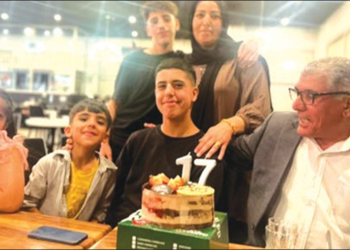Two others have been convicted of organizing and executing the gangland murder. Those two are both Englishmen.
The murder shocked Liver-pool. Bahman Faraji was shot square in the face at point blank range while standing on a sidewalk. The killer simply walked away.
 The Liverpool Echo said Faraji was lured to his death unaware a trap laid weeks earlier was closing in around him.
The Liverpool Echo said Faraji was lured to his death unaware a trap laid weeks earlier was closing in around him.
The 44-year-old Faraji arrived in England from Iran in 2001, seeking asylum.
He landed in Liverpool and over the next decade went on to work as a doorman, meet partner Justine Brown and have a son, now six. In the process, he made “plenty of enemies,” people around him told the Echo.
Faraji, a formidable figure physically, was said to have extorted money from businesses for “protection,” taxed drug dealers for their illegal wares or profits and fallen out with some of the city’s more notorious underworld elements.
When he was once pulled over by police, he was found to be wearing body armor and told officers it was because of some “trouble” he was having with a local family.
His activities sent him to the hospital periodically, once after being skewered with a sword by a Turkish man he had reportedly robbed. The pair crossed in the street and “went for aeach other” with both men ending up in adjacent wards.
One of Faraji’s most distinctive features – a huge scar running down his left cheek – was said to have come about as part of a dispute with other gangsters.
In the end, it was a man he had considered a friend for many years that plotted to end his life. Jason Gabbana, also known as Jason Ghorbanian and Jason Kelly, was also a member of Liverpool’s Iranian community and had known Faraji since the dead man’s arrival in Liverpool.
The Liverpool Echo said Gabbana enjoyed a comfortable life of strip clubs, drinking and girls that was paid for from a huge payment the Liverpool police made to him for a false prosecution. In 2003, he was convicted of raping a teenager. On appeal, the conviction was overturned when it was discovered the girl had made false rape claims against other men—a fact the police did not disclose.
The prosecution said Faraji and Gabbana fell out late in 2010—though Gabbana denied that—and the plot was hatched to end Faraji’s life.
The two juries who tried those involved in the murder were never given more of a motive than “bad blood” between the pair. Gabbana seemed to be counting on that. He told the jury, “When you watch ‘Columbo’ or ‘Murder She Wrote’ or ‘Law and Order,’ the first thing they look for is a motive. And I had no reason, no motive, to want him dead. What is the reason? What is the motive? I had none.”
What eventually led to Gabbana’s conviction was a telephone record that showed him in contact with the main figure organizing the killing over a cellphone that was used for no calls apart from planning the killing.
And there were other phones and other calls involved in the evidence presented in court.
Less than three weeks before the shooting, Faraji took a call from a pay-as-you-go phone. The man at the other end of the line called himself “Mick” and said he wanted to do “business” with the victim.
Over the next 19 days there were several more calls between the pair. That phone, police later discovered, was only ever used to contact Faraji.
They termed it “the murder phone,” bought and used for the sole purpose of befriending the victim and luring him to his fate.
Faraji was called to The Belgrave pub for a meeting with “Mick” on the night he was killed. But instead of “Mick,” Edward Heffey arrived with a gun.
“Mick,” the Liverpool Crown Court jury found after a 16-week trial, was actually convicted drug trafficker Simon Smart.
Under the orders of Gabbana, the jury found, Smart used the “murder phone” to draw the victim to the pub, while using his own cellphone to get gunman Heffey into position to strike.
Hiding the gun, Heffey walked up to the victim, and asked “Are you Ben?” —as Faraji was sometimes called.
When Faraji nodded, Heffey lifted the gun and blasted the victim in the face from almost point-blank range.
When Heffey rang Smart to tell him the job was done, Smart then relayed the message to Gabbana, who was at home watching a soccer game on the TV and surfing the Internet, going on dating and escort websites.
Women were one of his main vices and on the eve of his trial Gabbana rang and threatened a girl he once dated after she gave police a damning statement.
She told police Gabbana had shown her a picture of Faraji on a newspaper website and told her that Faraji was a “problem.”
Calling from an illegal cellphone from inside prison, Gabbana said unless she changed her statement, he would make her family aware of something she would want kept secret.
Gabbana, 29, gunman Heffey, 41, and the organizer, Smart, 33, have all been sentenced to life in prison. The jury decided that Brian Regan, 54, who drove Heffey to and from the murder site and waited around the block for him, knew nothing of the plot and found him innocent. But while investigating him, police found a stash of drugs in his possession, so he will be spending time in prison for that.
The Liverpool media focused most of its attention on Regan because he had appeared in a popular television soap opera for a decade and was a well-recognized figure.


















